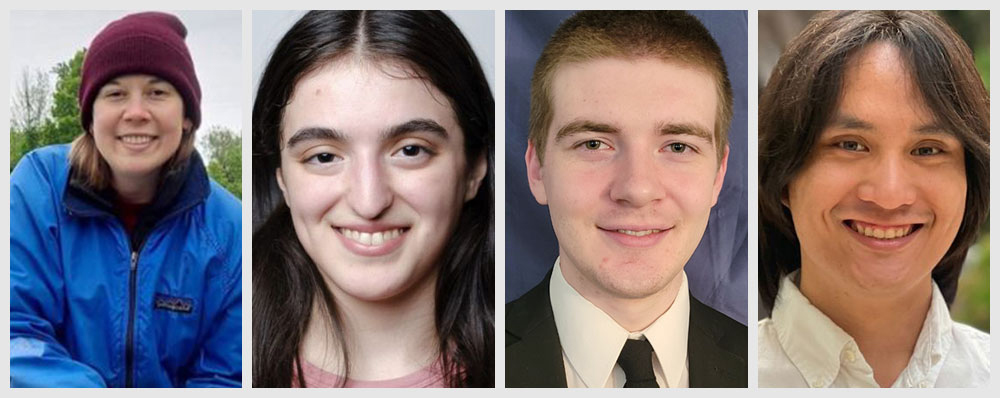 DePaul graduate students Kiley Chernicky, Elene Drosos, Andrew Jocham and Raffy Traas have earned fellowships to fuel their diverse research interests related to space and atmospheric science. (Submitted photos)
DePaul graduate students Kiley Chernicky, Elene Drosos, Andrew Jocham and Raffy Traas have earned fellowships to fuel their diverse research interests related to space and atmospheric science. (Submitted photos) Extraterrestrial life, interstellar nurseries, and the impact of deforestation and air travel on our climate: College of Science and Health graduate students have received $10,000 fellowships from the Illinois Space Grant Consortium to pursue research in these areas.
Kiley Chernicky, Elene Drosos, Andrew Jocham and Raffy Traas have each earned the prestigious award to fuel the next frontier of their diverse research, all connected to Earth and space. DePaul has been a member of the consortium since 2004, which is part of NASA's National Space Grant College and Fellowship Program.
“The extraordinary partnership funds DePaul students and faculty each year in a variety of disciplines, from astrophysics, chemistry, and math to environmental studies,” says Bernhard Beck-Winchatz, professor of physics and astrophysics. He also serves as campus director of the consortium. “These awards support cutting-edge, timely research in space-related and atmospheric science.”
This academic year, the consortium will award DePaul a record amount of $104,500 for undergraduate and graduate research. This year's fellowship recipients share a passion for scientific curiosity, excellence, and innovation, a key part of the NASA funding framework.
Kiley Chernicky, a master’s student in Biological Sciences, seeks to gain a better understanding of how forest ecosystems are responding to climate change, supported by a long-standing interest in environmental biology.
As an undergraduate, Chernicky studied the effects of degrading mangrove-adjacent forest habitats on a coastal crab species. After spending time studying boreal forests in the Yukon Territory, Chernicky decided to shift her focus to understanding climate-driven shifts in these vulnerable forest landscapes.
For the fellowship, she will conduct extensive fieldwork in North American boreal forests to study how white spruce and balsam fir trees are responding to climate change.
“The boreal forest is a globally important carbon sink and is particularly vulnerable at its southern range due to a variety of factors including, drought, fires, and insect outbreaks. All of these are influenced by climate change," Chernicky explains.
 The Illinois Space Consortium will award DePaul a record $104,500 this year for undergraduate and graduate research. (iStock.com/da-kuk)Elene Drosos
The Illinois Space Consortium will award DePaul a record $104,500 this year for undergraduate and graduate research. (iStock.com/da-kuk)Elene Drosos is a master’s student in Environmental Science and will research damage from ambient ozone pollution on plants in the Chicagoland area. The fellowship will allow her to track the effects of secondary ozone pollution from NOx (nitrogen oxides) and volatile organic compounds. Commonly called VOCs, these compounds are released when fuel is burned at high temperatures and can be emitted from vehicles, airplanes, and industrial sources.
Drosos will use ozone indicator gardens at Highland Park, O'Hare International Airport, and the Peggy Notebaert Museum to visualize damage through burn marks, known as stipples, on the leaves of sensitive plants in conjunction with ozone air quality sensor readings and photosynthesis/plant functioning data from garden samples.
Drosos first became interested in plant science as an undergraduate at DePaul, where she was a research assistant in
Jessica Vogt's Lab for Urban Forestry in the Anthropocene. Ultimately, she hopes to use this research to support further study air transportation impacts the environment.
Andrew Jocham, pursuing a master’s degree in physics, is also studying how stars form. The fellowship will support his thesis research on high-mass stars — those whose mass is at least eight times greater than that of the sun. He will examine how stars seed additional star formations by distributing heavy elements in interstellar space.
Jocham will be looking at the ATLASGAL survey, which has identified up to 10,000 dust clumps in our galaxy that could provide the breeding ground for new stars, or “stellar nurseries." Working with
Anuj Sarma, Jocham will perform data analysis with a radio instrument to develop a model of the chemical makeup of the star-forming region and its time evolution to better understand the environmental conditions and processes of these unique areas.
Jocham hopes to become a researcher in the field of observational physics as a project leader or data analyst.
Raffy Traas, a graduate student in the M.S. in Physics, began his research pondering the existence of life elsewhere in the cosmos. Looking ahead, he hopes to support the NASA Astrophysics Science Division and the Philippine Space Agency.
“I was adopted from the Philippines when I was 2 and am a proud Filipino. Growing up without any Filipino astrophysicist role models, I hope to someday inspire young Filipinos interested in the universe to pursue their dreams," Traas says.
Traas plans to use the fellowship support to study the role of magnetic fields in high-mass star formation to help determine how stars emerge. In collaboration with thesis advisor Sarma, Traas will be working with the Very Large Array, the world's largest radio telescope.
He is starting from a solid foundation. As part of the Breakthrough Listen team at UC Berkeley, Traas operated a 100m radio dish at the Green Bank Observatory in West Virginia to detect narrowband, artificial, spectral features – technological 'signatures' – that may suggest intelligent life beyond Earth.
Dina Khdair is coordinator for research and graduate programs in the College of Science and Health. This is an abridged version of a story shared with the college earlier this quarter.
Read more news from the college online.